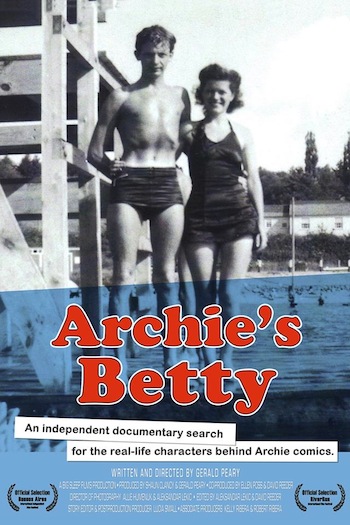Film Interview: Gerald Peary Searches For “Archie’s Betty”
Making Archie’s Betty compelled Gerald Peary to confront his inner Archie: “The more I made this movie, the more personal it got.

Veronica, Archie, and Betty in a ’50s issue of “Archie Comics.”
By Tim Jackson
In the fanciful ’50s, prior to the sexual revolution, a pre-teenage boy might well experience his first sexual stirrings from reading an Archie Comic: its principle femmes, Betty and Veronica, were babes. Scholar, documentary filmmaker, and Arts Fuse critic Gerald Peary, once a rebellious and shy adolescent, experienced that tantalizing yearning: “Betty was cute and sweet, the girl you could talk to, the accessible person. If you were shy as a kid, Betty was there. Veronica held no interest. She’s a hottie, but spoiled. I never cared for her at all,” In his new film, Archie’s Betty, Peary searches for the inspiration for Archie’s blond sweetheart, Betty Cooper. (Screening at Boston’s Institute of Contemporary Art on May 30 and 31 and June 14.)
The film is, however, much more than just a quest for a crush past. A letter in the Boston Globe, suggesting that Haverhill, Massachusetts may have been the inspiration for Riverdale, the small town where Archie and his pals lived, left Peary aquiver with excitement. “lt led me right back to my obsession with Archie as a kid,” he recalls. In 1988, he wrote an investigative piece for the Globe Sunday Magazine about that Haverhill connection. In 2010 he received an unexpected e-mail from Shaun Clancy, a comic book expert whose mother had gone to Haverhill High School. Beyond the comic’s origins, Clancy’s particular interest was Bob Montana, the creator and original illustrator of Archie Comics. The idea for a short, and soon a feature film, began to evolve.
The model for one Archie character had remained a mystery – Betty. Montana’s widow, Peg Bertholet, told Peary that Betty was the only figure who was not actually from Haverhill. The movie uses the quest for the ‘real life’ Betty as a way to examine the Archie phenomenon.

The irony is that Peary has never been a comic book aficionado. But he has been a life long fan of the Archie series. The film invited him to confront his inner Archie: “The more I made this movie, the more personal it got. I was, as I am now, a rascal with a sharp and sarcastic tongue. I was always in trouble especially in high school, kicked out of classes, sent to the principal’s office. I graduated only if I would apologize to the English teacher who had kicked me out of class 6 weeks earlier. Archie did all those things, but is essentially a good kid. That was important for my self esteem, not to believe I was a bad person.” Archie’s pal Jughead was another important archetype. “Jughead is totally key,” argues Peary. “He listens to his own drummer and cannot be moved by any act of conformity. I pride myself on being my own person, aesthetically certainly. He also made it OK to take your time with girls.”
As he looked into the origins of Archie, the sharp-tongued critic found a touching sweetness in how the comic came about and in the memories of those who still remember Bob Montana. Peary’s personal narration, along with the poignant reminiscences of the interviewees, makes the discovery of the real Betty a very moving payoff. In the age of the Marvel Universe, Archie Comics may seem quaint and nostalgic, but what the film makes abundantly clear is that the appeal of Archie remains deep and enduring because it is grounded in the real world, in authentic character types, and in honest emotions: “Archie has sold around the world since 1941. Interestingly, it’s huge in India and Pakistan and Abu Dhabi,” Peary says. He returned recently from the Buenos Aires Independent Film Festival, where Archie’s Betty premiered: “The Mexican Archie, called Archie Gomez, sold all over Latin America and the director of the festival is a huge fan.”
The appeal of these characters continues in many forms. In addition to numerous Betty, Veronica, and Jughead comic spinoffs and an animated series, there is a new updated Archie character, an Official Archie Comics Podcast, an Official Archie Comics YouTube Show, a comic series called Archie vs. Predator, and even a mock comic trailer for a gritty Canadian film called Riverdale. Archie’s Betty looks beyond the homages, spoofs, and retreads to celebrate the allure of the original.
Tim Jackson is an assistant professor at the New England Institute of Art in the Digital Film and Video Department. His music career in Boston began in the 1970s and includes some 20 groups, many recordings, national and international tours, and contributions to film soundtracks. He studied theater and English as an undergraduate and has also has worked helter skelter as an actor and member of SAG and AFTRA since the 1980s. He has directed a trio of documentaries: Chaos and Order: Making American Theater about the American Repertory Theater, and Radical Jesters, which profiles the practices of 11 interventionist artists and agit-prop performance groups. His third documentary, When Things Go Wrong, about the Boston singer/songwriter Robin Lane, with whom he has worked for 30 years, has just been completed. He is a member of the Boston Society of Film Critics. You can read more of his work on his blog.
Tagged: Archie Comics, Archie's Betty, Betty, Bob Montana, documentary
